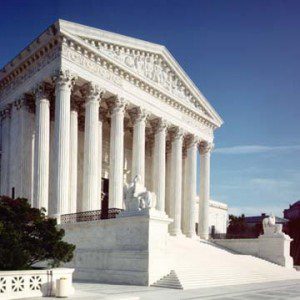 Neil Gorsuch was sworn in, informally, and has joined the Supreme Court. A more ceremonial swearing in will take place later. But he is already on the job, in time to hear some important cases.
Neil Gorsuch was sworn in, informally, and has joined the Supreme Court. A more ceremonial swearing in will take place later. But he is already on the job, in time to hear some important cases.
In a column on the “nuclear option,” Charles Krauthammer observes that the Supreme Court has been turned into a “superlegislature.” Liberals especially are looking to the court to achieve their political ends.
Liberal judicial theory says that the courts should honor “evolving social norms.” But surely, Krauthammer says, elected representatives are in a better position to reflect evolving social norms. Constitutionally, the judicial branch should instead be keeping all of these evolving social norms within the parameters of the Constitution.
From Charles Krauthammer, Karma, precedent and the nuclear option – The Washington Post:
A major reason these fights over Supreme Court nominations have become so bitter and unseemly is the stakes — the political stakes. The Supreme Court has become more than ever a superlegislature. From abortion to gay marriage, it has appropriated to itself the final word. It rules — and the normal democratic impulses, expressed through the elected branches, are henceforth stifled.
Why have we had almost half a century of massive street demonstrations over abortion? Because the ballot box is not available. The court has spoken, and the question is supposedly settled for all time.
This transfer of legislative authority has suited American liberalism rather well. When you command the allegiance of 20 to 25 percent of the population (as measured by Gallup), you know that whatever control you will have of the elected branches will be fleeting (2009-2010, for example). So how do you turn the political order in your direction? Capture the courts.
They are what banks were to Willie Sutton. They are where you go for the right political outcomes. Note how practically every argument at the Gorsuch hearings was about political outcomes. Where would he come out on abortion? Gay marriage? The Democrats pretended this was about principle, e.g., the sanctity of precedent. But everyone knows which precedents they selectively cherish: Roe v. Wade and, more recently, Obergefell v. Hodges .
Liberalism does not want to admit that the court has become its last reliable instrument for achieving its political objectives. So liberals have created a great philosophical superstructure to justify their freewheeling, freestyle constitutional interpretation. They present themselves as defenders of a “living Constitution” under which the role of the court is to reflect the evolving norms of society. With its finger on the pulse of the people, the court turns contemporary culture into constitutional law.
But this is nonsense. In a democracy, what better embodiment of evolving norms can there be than elected representatives? By what logic are the norms of a vast and variegated people better reflected in nine appointed lawyers produced by exactly three law schools?
If anything, the purpose of a constitutional court such as ours is to enforce old norms that have preserved both our vitality and our liberty for 230 years. How? By providing a rugged reliable frame within which the political churnings of each generation take place.
[Keep reading. . .]
Photo of the Supreme Court building, Public Domain, https://commons.wikimedia.org/w/index.php?curid=386160
 Neil Gorsuch was sworn in, informally, and has joined the Supreme Court. A more ceremonial swearing in will take place later. But he is already on the job, in time to hear some important cases.
Neil Gorsuch was sworn in, informally, and has joined the Supreme Court. A more ceremonial swearing in will take place later. But he is already on the job, in time to hear some important cases.










